Report on Self-Efficacy and Gender in Influencing Mental Well-Being
Added on 2020-04-15
22 Pages5768 Words124 Views
The Role of Self-Efficacy and Gender inInfluencing Mental Well-Being among 18-60age categories of Colombo SuburbsDimuthu YakandawalaA report presented in the Faculty of Healthand Life Sciences, Coventry University,towards the degree of (Bachelor of Sciencewith Honours in Psychology),(Date of submission)
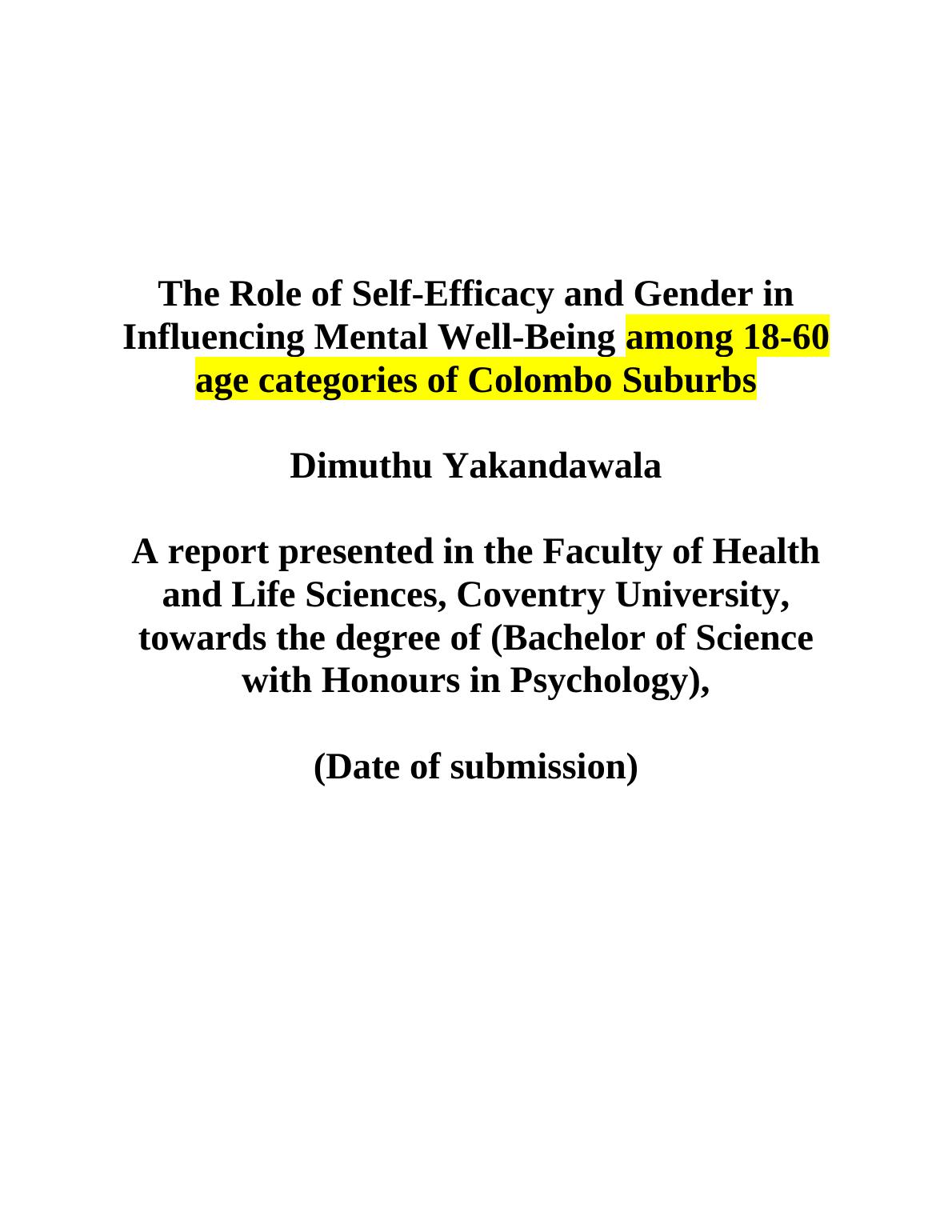
ABSTRACT Mental well-being could explain one’s social behaviour and many other characteristics. Self-efficacy had been found to associate with various factors that govern one’s overall mental well-being in an individual. However, there have been limited studies on how self-efficacy andgender could act as a predictor of mental well-being in the Sri-Lankan context. The current studywas carried out to investigate the interaction of Self-efficacy and gender in influencing mentalwellbeing in the general population. A descriptive cross-sectional study was carried out with convenient sampling with a sample of114 participants that consists of 29 males and 85 females in Colombo suburbs within the agegroup 18 to 60 years. They were assessed on demographic characteristics, general self-efficacy and mental wellbeing.A Two- way ANOVA through SPSS was conducted to find the interaction between self-efficacyand gender in influencing mental wellbeing. According to the analysis the results demonstrated that there was a statistical significantinteraction between self-efficacy and mental wellbeing however, the relationship between genderand mental wellbeing and both self-efficacy and gender did not show a statistical significantinteraction with mental wellbeing. It is concluded that the self-efficacy acts as a predictor of mental wellbeing. Research challengesthat future studies need to emphasise the importance of gender in predicting mental wellbeing.Keywords: Self-efficacy, Psychological Well-Being, Gender
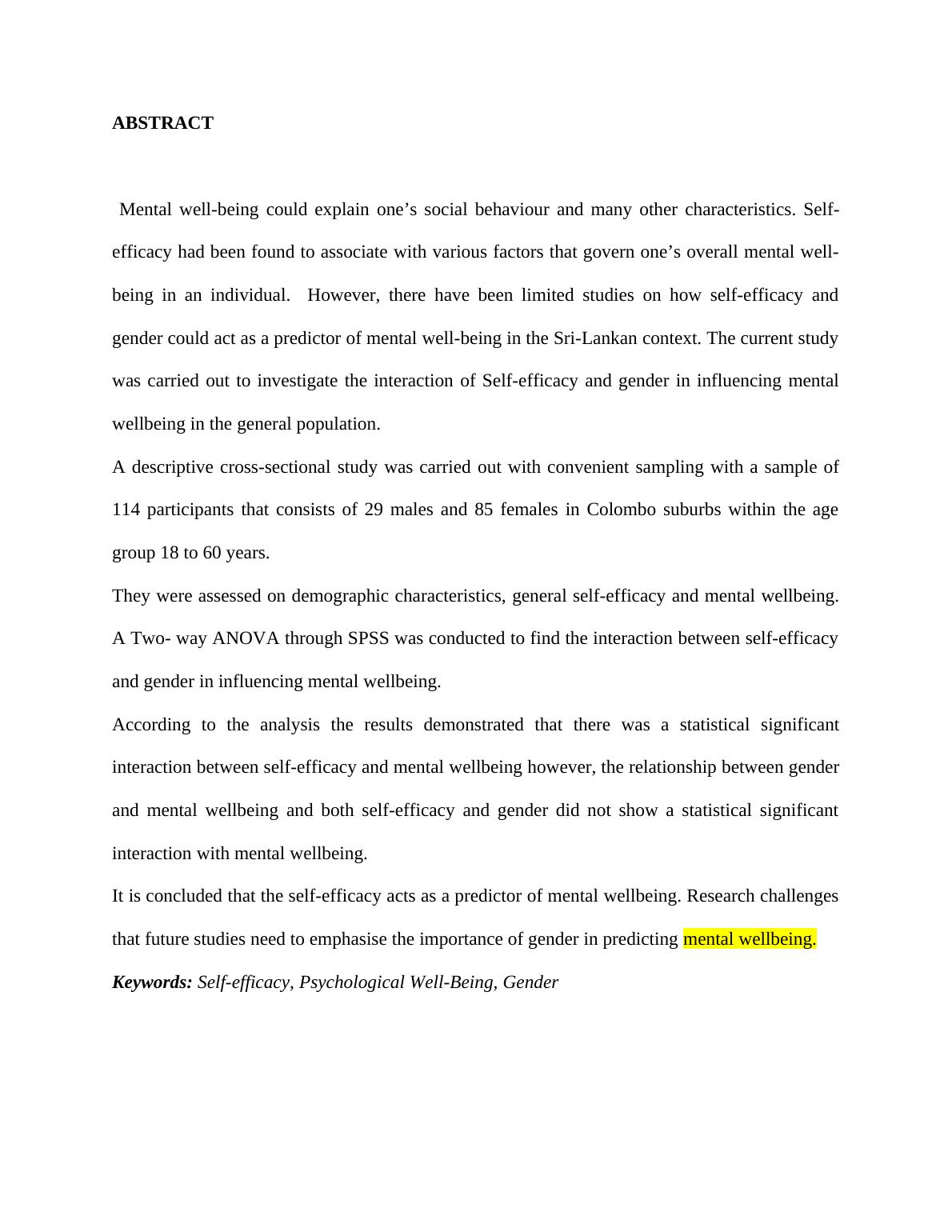
IntroductionSelf-Efficacy The concept of Albert Bandura’s self-efficacy is linked with judgments that individuals makeconcerning their capacity to exhibit conduct applicable to a particular errand or circumstances. Italludes to the confidence in one’s capacity to act in such a route or to deliver a desirable outcome(Bandura, 1977). Self-efficacy has various sorts of effects on how individuals feel, think and act.Self– efficacy relates to hopeful conviction about having the capacity to adapt to an assortmentof stressors. Self- efficacy is characterized as self-assessment of one's capability to effectivelyexecute a strategy important to achieve wanted results. (Zimmerman, 2000) argues that it is amulti-dimensional construct that differentiates between demands (Siddiqui 2015). Self–efficacy pertains to optimistic belief about being able to cope up with a variety of stressors.People with high Self- Efficacy choose to perform more challenging and difficult tasks. Thosewho have low levels of Self-efficacy may brush with depression, anxiety and helplessness.People with high levels of self-efficacy on the other hand, approach life with a can – do attitudethat allows them to see challenges as problems to be solved instead of threats that must beavoided. They also set appropriately challenging goals for themselves and maintain a strongcommitment to those goals. People with strong Self–Efficacy enjoy life because they are highly
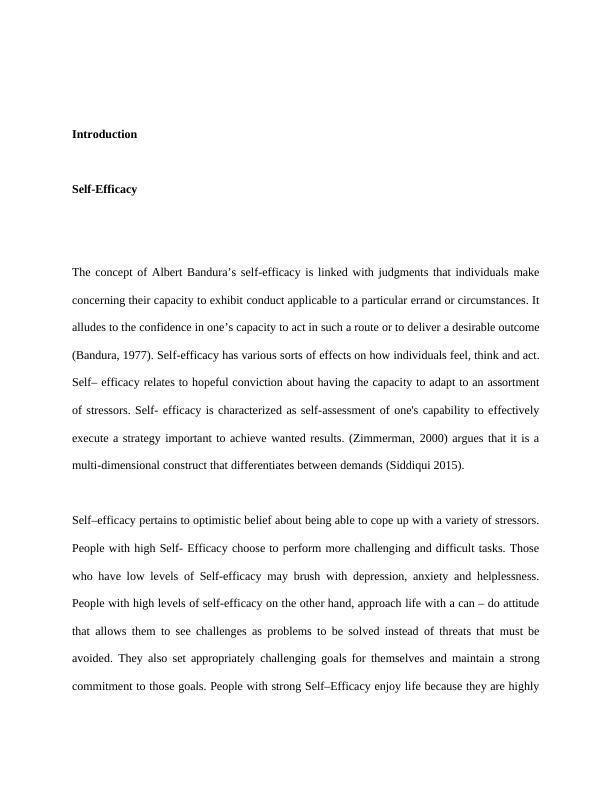
engaged. When they encounter stressful situations their belief in their ability to managesituations to their benefit allows self –confidence (Siddiqui 2015). However, individuals feeling low levels of self-efficacy may be worried about discouragement,nervousness and weaknesses. They approach existence with a can’t – do mentality that causesthem to consider difficulties to be dangers that one must maintain a strategic distance from ratherthan issues to be tackled and eliminated. High self-efficacy is identified with positive prosperity,direction of stress, higher confidence, better physical condition, as well as better adjustment toand recuperation from diseases says(Bandura, 1997; Bisschop, Knegsman, Beekman, &Deeg,2004; Kuijer& de Ridder, 2003). In contrast, low self-efficacy is identified with more side effectsof nervousness and depression (Faure &Loxton, 2003; Kashdan& Roberts, 2004; Shnek, Irvine,Stewart, & Abbey, 2001) and additionallybrings down levels of Mental Well- Being(Barlow,Wright, & Cullen, 2002; Bandura, Caprara, Barbaranelli, Gerbino, &Pastorelli, 2003; Caprara,2002). (Siddiqui 2015).Mental Well BeingMental Well Being is a subjective sentiment control joy fulfilment with life encounters ones partin the realm of work, feeling of accomplishment, utility ,belongingness, and no pain , areas orstress and so forth. It has been demonstrated that different variables influence adolescent’s levelof mental well being. Mental well being to some degree is a pliant idea which is the sentimentindividuals regular day to day existence exercises such emotions may go negative mental state ormental strains, for example, nervousness, articulation, disappointment ,passionate,fatigue ,misery, disappointment to a state which has been recognized as positive psychological
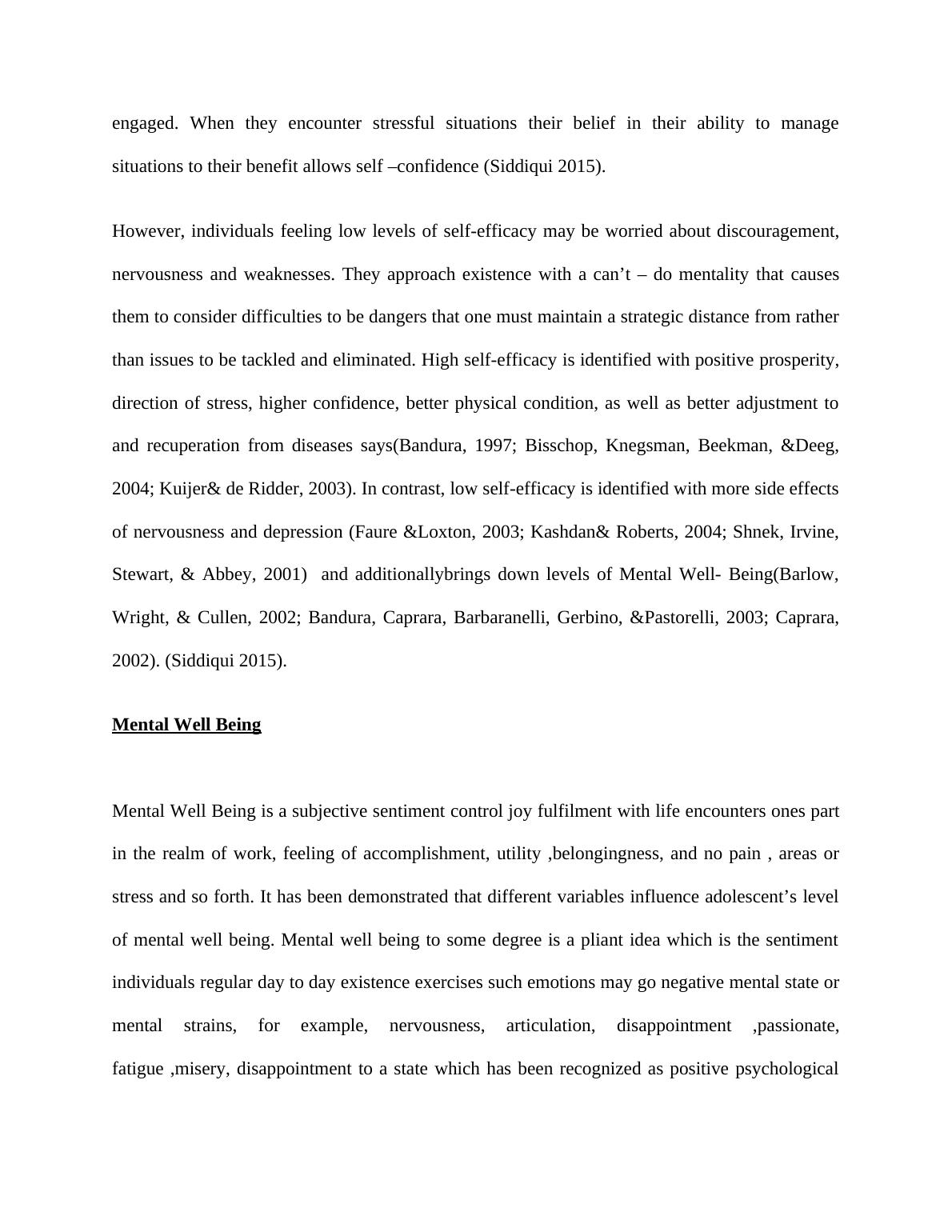
wellness. (Bornstein, Davidson, Keyes, and Moore 2003) characterized prosperity as "thecondition of fruitful execution for the duration of the life course incorporating psychical,psychological, and socio-emotional capacities that outcomes in.Mental well being is defined as a state of well-being in which every individual realizes his or herown potential to cope with the normal stresses of life, can work productively and fruitfully, andis able to make a contribution to her or his community (WHO,2017) There are existing gaps in local literature regarding the roles of self-efficacy and gender inenhancing psychological wellbeing. As well as in the current society it is evident that there arevarious problems based on education, in the work place etc, due to people being unhappy. Paststudies have demonstrated a strong association between self-efficacy with factors such suicidalideation, depression and others. These are the factors that govern one’s mental well being.However, there have been limited studies done on how self- efficacy could act as a predictor ofmental well being; therefore there is a little understanding about self- efficacy and mental well-being in the Sri-Lankan context. OBJECTIVES OF THE STUDYGeneral Objective
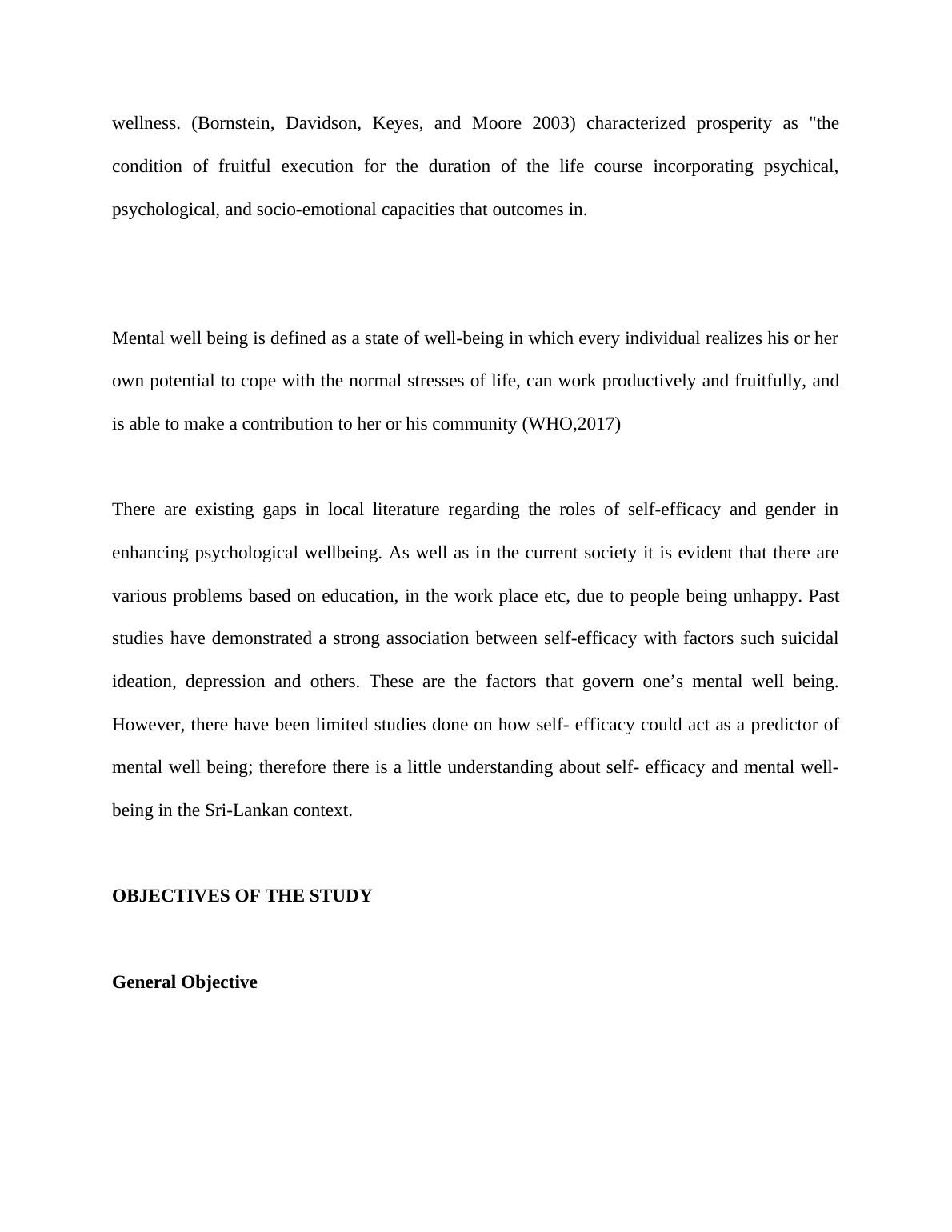
To determine the role of Self- Efficacy and gender in influencing Mental Well-Being among agecategory of 18 to 60 years in the Colombo suburbs.Specific Objective 1.To determine the degree to which Self Efficacy and gender could predict Mental Well-Being among the age groups of 18 to 60 years in the Colombo suburbs. 2.To determine the applicability of the two constructs, self- efficacy and mental well beingin the Sri Lankan context. 3.To describe some factors associated with mental wellbeing among the age groups yearsin the Colombo suburbs. Research Question Is there a relationship between self-efficacy and gender in influencing mental well being inadults?HYPOTHESIS OF THE STUDY 1.H1 (AlternateHypothesis): There is a statistical significant interaction between self-efficacy and gender in influencing mental well being.
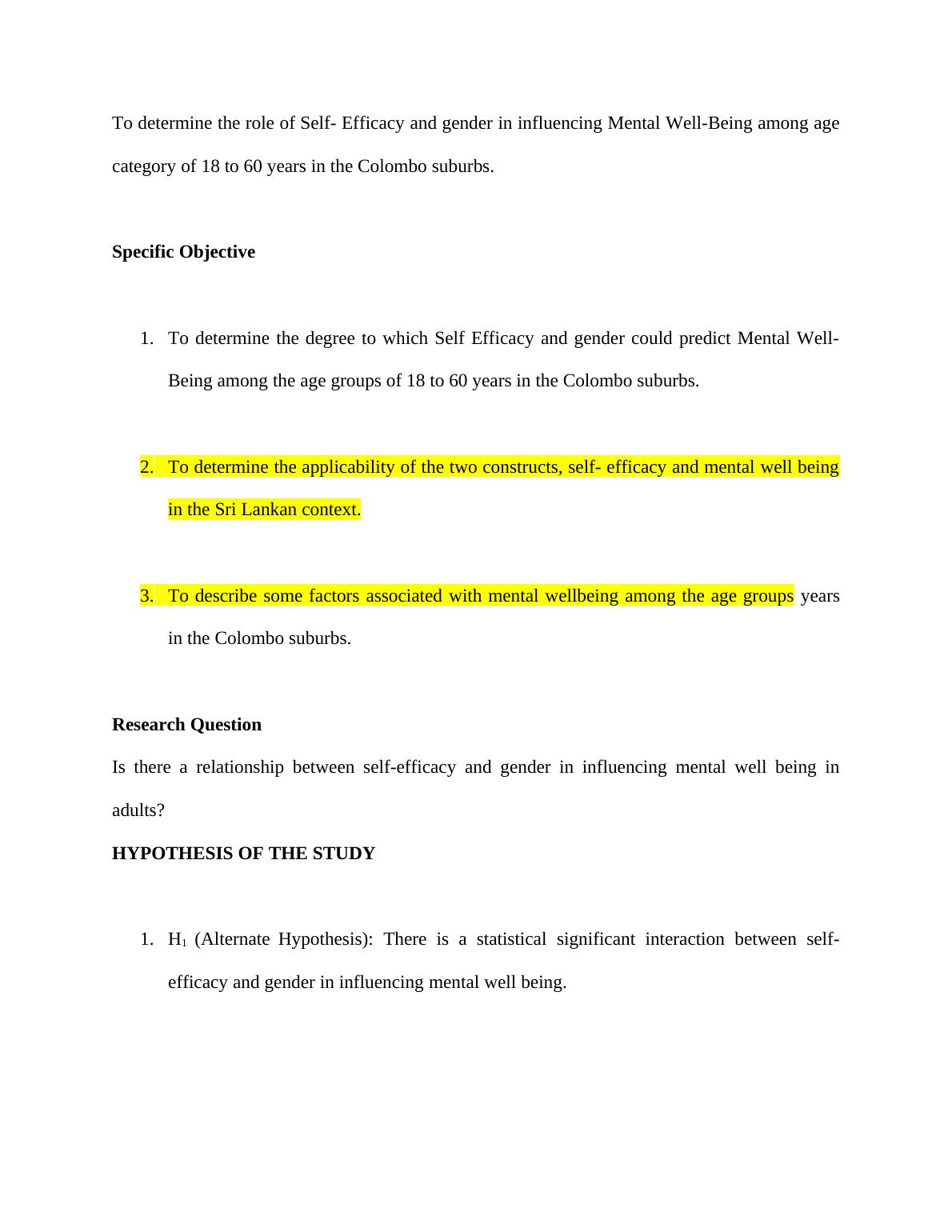
End of preview
Want to access all the pages? Upload your documents or become a member.
Related Documents
Self Efficacy and Gender Studylg...
|20
|4663
|216
Report on Self-efficacy and Genderlg...
|6
|2037
|285
Sample Assignment on Public Health (pdf)lg...
|20
|6320
|142
(PDF) Grand Challenges in Global Mental Healthlg...
|10
|2878
|320
Assignment on Self-Leadership - Introductionlg...
|8
|1877
|39
Assignment on Interventions in Mental Health for Athleteslg...
|12
|782
|16
